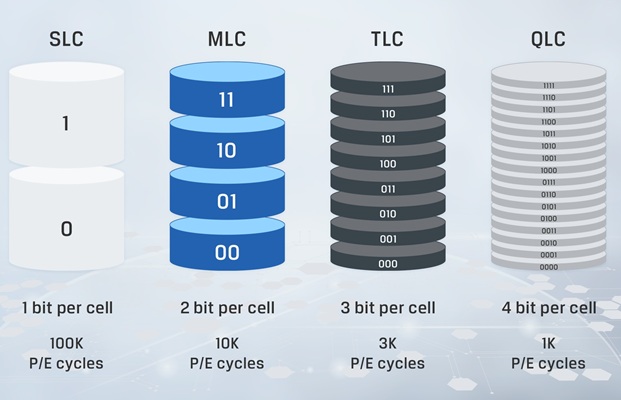An SSD (Solid State Drive) is a storage device that uses NAND flash memory instead of spinning disks. With no moving parts, SSDs deliver faster speeds, higher durability, and more reliability compared to traditional HDDs.
👉 Translation: An SSD means faster boot-ups, quicker file transfers, and smoother everyday use.
SLC NAND
Pro: Highest endurance – Con: Expensive and low capacity
Single-level cell (SLC) NAND stores only 1 bit per cell. This makes SLC the fastest and most durable NAND option, with outstanding data retention and reliability. However, because of its low data density, SLC drives are also the most expensive.
SLC is typically found in Industrial SSDs, Military SSDs, Rugged SSDs, and Wide Temp SSDs designed for mission-critical applications such as aerospace, defense, automation, and data security.
MLC NAND
Pro: Cheaper than SLC – Con: Slower and less endurance
Multi-level cell (MLC) NAND stores 2 bits per cell, offering a balance of performance and price. With around 10,000 P/E cycles, MLC NAND delivers solid endurance and reliability at a lower cost than SLC.
MLC is widely used in Industrial SSD Drives, Industrial M.2 SSDs, and Enterprise Storage Systems, where high performance is important but cost-effectiveness also matters.
TLC NAND
Pro: Cheapest and high capacities – Con: Lower endurance
Triple-level cell (TLC) NAND stores 3 bits per cell, making it the most common type of NAND in the market today. TLC offers large capacities and affordable pricing, but endurance is limited to around 3,000 P/E cycles.
TLC is ideal for 2.5 SATA SSDs, M.2 SATA SSDs, and mainstream NVMe drives, where users want a cost-effective balance of storage space and performance—perfect for laptops, desktops, and general workloads.
QLC NAND
Pro: Maximum capacity, lowest cost – Con: Shortest lifespan
Quad-level cell (QLC) NAND stores 4 bits per cell, providing the highest density and lowest cost per GB. However, QLC comes with the lowest endurance of only about 1,000 P/E cycles, making it less suited for heavy write workloads.
QLC is best for read-intensive tasks such as media storage, cloud systems, backup solutions, and content libraries where massive capacity matters more than endurance.
Summary
Not all SSDs are the same. SLC is unmatched for durability and industrial environments. MLC offers a smart balance between cost and performance. TLC gives consumers affordable storage with high capacities. QLC delivers the lowest-cost solution for data-heavy but read-focused needs.
At Indudisk, we provide a full range of Industrial SSDs, Military SSDs, Rugged SSDs, and Wide Temperature SSDs—from 2.5 SATA SSDs to M.2 NVMe SSDs—helping customers choose the right storage solution for every environment, whether it’s factory automation, AI servers, aerospace, or defense.
🚀Indudisk Industial SSDs and Military SSDs are built for extreme environments where compromise isn’t an option.


